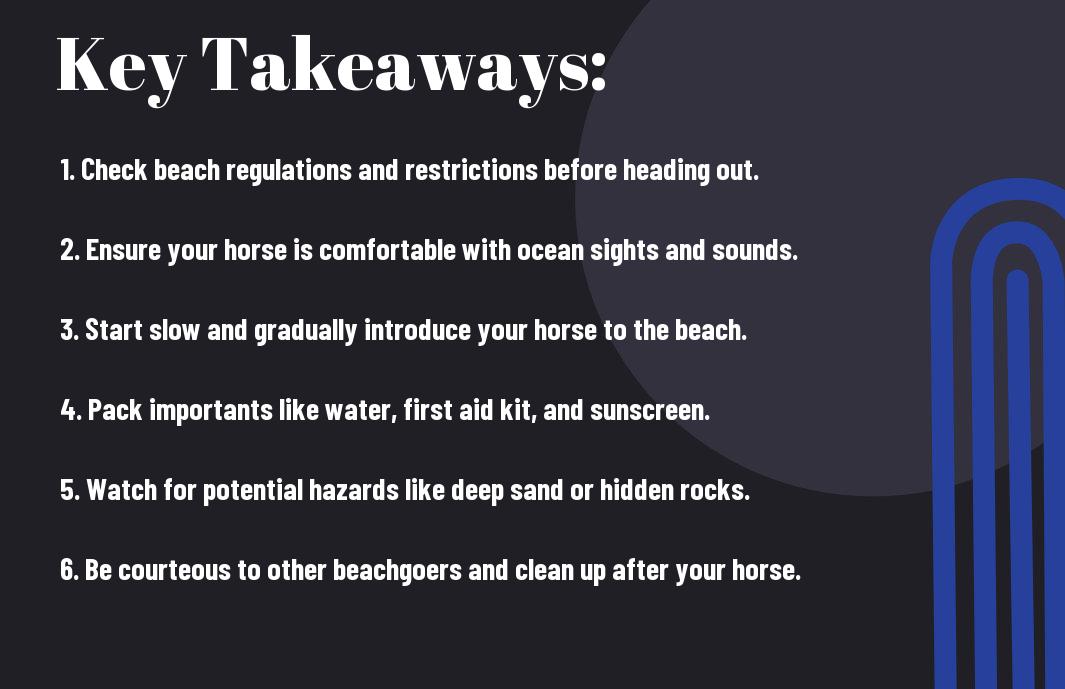Embarking on a seaside adventure with your equine companion can be a thrilling experience, but it requires preparation and caution. You must be mindful of the sandy terrain’s potential hazards and the unpredictable nature of the waves. In this guide, we will provide you with vital tips for a safe and enjoyable beach ride. From proper hoof care to knowing the tide schedule, these suggestions will help you and your horse make the most of your beach outing.


Preparing for the Beach Ride
Choosing the Right Horse
To ensure a successful beach ride, choose a horse that is calm, confident, and used to new environments. The beach can be an exciting but potentially overwhelming experience for some horses. You want a steed that will enjoy the salty breeze and sound of crashing waves. Look for a horse that is sure-footed and has a steady demeanor, as sandy terrain and water can be challenging for some animals.
Essential Equipment and Safety Gear
When gearing up for a beach ride, it’s vital to have the right equipment and safety gear to ensure both you and your horse have a safe adventure. A well-fitted saddle with non-slip padding is imperative, as sandy surfaces can be slippery. Additionally, make sure to use a bridle with reins that offer you control and communication with your horse in potentially distracting beach conditions.
Plus, don’t forget to pack a first aid kit for both you and your horse in case of any minor injuries. Having imperatives such as bandages, antiseptic cream, and hoof picks can be a lifesaver if any mishaps occur during your beach escapade.

Beach Etiquette and Rules
Respecting Other Beachgoers
You should always respect other beachgoers while enjoying a day at the beach with your horse. Make sure to keep a safe distance from people who are not familiar with horses or may be afraid of them. This will help prevent any accidents or disturbances. Additionally, be mindful of noise levels and avoid galloping or running your horse too close to others. Being considerate and respectful of fellow beach visitors will ensure that everyone can enjoy their time at the beach.
Following Local Regulations
When taking your horse to the beach, it is crucial to follow all local regulations and rules. These may include designated horse-friendly areas, specific times of the day when horses are allowed on the beach, or required permits. Failure to comply with these regulations can result in fines and penalties, and negatively impact the beach environment for both you and other beachgoers.
Beachgoers should educate themselves on the rules and regulations of the beach they plan to visit before bringing their horse. This will help ensure a smooth and enjoyable experience for everyone while maintaining the integrity of the beach ecosystem.

Horse Care on the Beach
Hydration and Snacking
Unlike your usual rides in the familiar surroundings of your stable or arena, the beach can offer some challenges for keeping your horse properly hydrated and nourished. To ensure your horse stays healthy and energized during your beach excursion, make sure to bring plenty of fresh water for them to drink. The salty ocean air and the physical activity of walking on the sand can lead to increased thirst, so offering water frequently is imperative.
Additionally, remember to pack some horse-friendly snacks like hay, carrots, or apples to keep your horse content and replenish their energy levels. Snacking on the go will help maintain your horse’s stamina and prevent them from feeling fatigued during your beach ride.
Protecting Your Horse’s Hooves and Coat
Your horse’s hooves and coat can be especially vulnerable to the elements when you take them to the beach. To protect their hooves from sharp seashells and hot sand, consider using hoof boots during your beach ride. These boots will provide a protective layer and prevent any discomfort or injury to your horse’s feet.
This extra layer of protection is crucial, as sharp objects hidden in the sand can easily cause cuts or bruises to your horse’s hooves. Moreover, the salty water and sand can be harsh on your horse’s coat, so rinsing them off with fresh water after your beach ride is imperative to maintain their skin and hair health.
Riding Techniques for the Beach
Adjusting to Soft Sand and Waves
On the beach, the terrain is quite different from the stable ground your horse is used to. Keep in mind that soft sand can be tiring for your horse, so adjust your pace accordingly. When riding on soft sand, your horse will need to work harder to move forward, so be prepared to give them breaks to catch their breath. Additionally, watch out for the waves as they can startle some horses. Introduce your horse gradually to the sound and sensation of the waves, so they can adjust to the new environment.
Maintaining Control and Balance
Soft sand can be challenging for maintaining control and balance while riding. With each step, your horse’s hooves sink into the sand, requiring more effort to move forward. To maintain control, use your legs and seat to guide your horse rather than relying heavily on the reins. Keep a light contact with the reins and focus on keeping your balance centered. Be prepared for sudden movements from your horse as they navigate the unfamiliar terrain, and use your core strength to stay steady in the saddle.
Safety Considerations
Once again, when venturing onto the beach with your horse, safety should be your top priority. The combination of open spaces, ocean waters, and potential hazards requires careful consideration to ensure a safe and enjoyable experience for you and your equine companion.
Avoiding Hazards like Rip Currents and Debris
An important safety consideration when taking your horse to the beach is to be aware of potential hazards such as rip currents and debris. Rip currents can be powerful and unpredictable, posing a significant danger to both you and your horse. It’s important to familiarize yourself with the signs of rip currents and avoid areas where they are likely to occur. Additionally, be mindful of debris washed up on the shore, as sharp objects or trash can injure your horse’s hooves.
Emergency Procedures and First Aid
An vital aspect of beach riding safety is knowing emergency procedures and first aid techniques in case of an accident or injury. Having a basic understanding of first aid for horses, including how to treat cuts, scrapes, or lameness, can be crucial in an emergency situation. In the event of a more serious injury, knowing how to stabilize your horse and contact emergency services promptly is vital.
During beach rides, it’s advisable to carry a first aid kit specifically designed for horses, including items such as bandages, antiseptic solution, and hoof-packing materials. It’s also a good idea to have a fully charged cell phone with you to call for help if needed.
Enhancing the Beach Riding Experience
Taking in the Scenery and Wildlife
Now, as you ride along the sandy shores with your majestic steed, take the time to appreciate the scenery and wildlife that surrounds you. The vast expanse of the ocean, the crashing waves, and the salty breeze all contribute to the sense of freedom and adventure. Keep your eyes peeled for seabirds soaring overhead, dolphins playing in the distance, or even seals basking in the sun on the shoreline.
Building Trust and Bonding with Your Horse
The relationship between you and your horse is crucial when launching on a beach riding adventure. Building trust and bonding with your horse not only enhances the riding experience but also ensures a safer and more enjoyable journey. As you navigate the sandy terrain together, communicate with your horse through gentle cues and reassurance. Take the time to groom and care for your horse before and after the ride, strengthening your bond through mutual respect and understanding.
Enhancing the bond with your horse will lead to a more harmonious partnership and a deeper connection during your beach excursions. Note, patience, consistency, and positivity are key elements in fostering a strong relationship with your equine companion.
Summing Up
Hence, taking your horse to the beach can be a thrilling experience for both of you. Remember to plan ahead, bring the necessary supplies, and take safety precautions to ensure a fun and successful trip. Enjoy the sound of the waves crashing, the feeling of the sand beneath your horse’s hooves, and the freedom that comes with riding along the shoreline. Embrace the adventure and create lasting memories with your equine companion as you explore the beauty of the beach together.
FAQ
Q: What should I consider before taking my horse to the beach?
A: Before taking your horse to the beach, consider their temperament, experience with water, fitness level, and any local regulations regarding horses on the beach. Ensure your horse is healthy and up to date with vaccinations.
Q: How can I prepare my horse for the beach trip?
A: To prepare your horse for a beach trip, gradually introduce them to water at home, desensitize them to beach elements like waves and seabirds, and practice loading and unloading them calmly from a trailer. Pack importants like water, first aid kit, and protective gear.
Q: What safety precautions should I take at the beach with my horse?
A: When at the beach with your horse, always wear a helmet, stay aware of your surroundings, avoid crowded areas, check tide times to prevent being stranded, and have a plan in case of an emergency. Keep a close eye on your horse’s behavior in the new environment.
Q: How should I care for my horse post-beach trip?
A: After a beach trip, rinse off your horse to remove saltwater and sand, check their hooves for any injuries or debris, offer plenty of fresh water to prevent dehydration, and monitor for any signs of exhaustion or stress. Allow your horse time to rest and recover.
Q: What are some benefits of taking your horse to the beach?
A: Taking your horse to the beach can provide mental stimulation, physical exercise, exposure to new environments, and help build trust and confidence between you and your horse. It can be a refreshing break from routine and offer a unique bonding experience.











